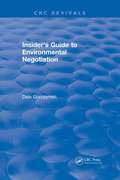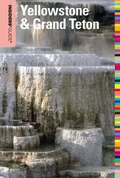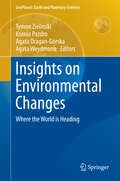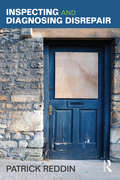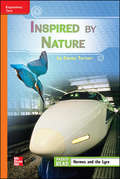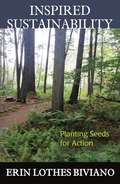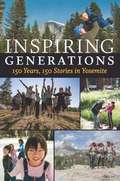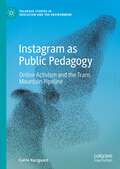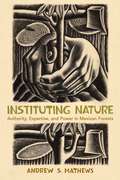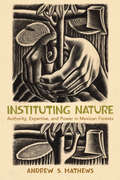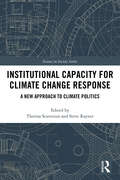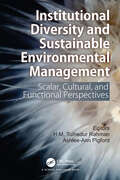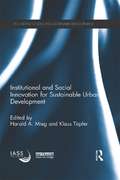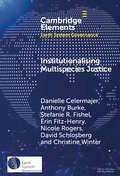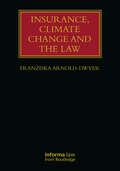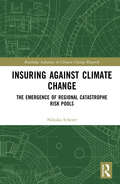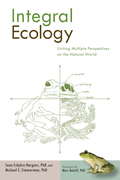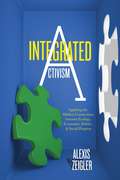- Table View
- List View
Inside the Water Cycle (Science Readers)
by William Rice Science StaffThe water cycle is like a circle-it has no beginning and no end. When the sun heats ocean water, it evaporates and forms clouds in the sky. When these particles get big enough, they can fall to Earth as precipitation in the form of rain, sleet, snow, or hail. When water hits the ground, it can change to liquid, soak into the ground, or run off and form streams or rivers. But it always makes its way back to the ocean, where the cycle "begins" again.
Insider's Guide to Environmental Negotiation
by Dale GorczynskiThis provides winning strategies from both corporate and environmentalist points of view and critical insight into the negotiation process, both formal and informal, private and public.
Insider's Guide to Environmental Negotiation
by Dale GorczynskiA one-of-a-kind book that provides winning strategies from both corporate and environmentalist points of viewInsider's Guide to Environmental Negotiation reflects the author's more than 10 years of experience in environmental negotiation and reveals secrets previously known only to insiders familiar with what is needed to win in this volatile arena. The author has been personally involved in all of today's significant issues, including hazardous waste, environmental health, subsidence and flooding, air quality, and water and wastewater. The book provides critical insight into the negotiation process, both formal and informal, private and public. It also offers valuable tips on techniques, such as using the media to your best advantage and developing effective strategies. This practical, easy-to-read book is invaluable for industry personnel, environmental groups, expert witnesses, government officials, lawyers, lobbyists, consultants, politicians, and anyone else involved in the difficult art of environmental negotiation.
Insiders' Guide® to Boulder and Rocky Mountain National Park (Insiders' Guide Series)
by Ann LeggettA local authors uncovers the real Boulder, from the high mountains and sparkling streams of Rocky Mountain National Park to the historic buildings, shops, galleries, and more.
Insiders' Guide® to Yellowstone & Grand Teton (Insiders' Guide Series)
by Brian HurlbutYour Travel Destination. Your Home. Your Home-To-Be. Yellowstone & Grand Teton—including Jackson, West Yellowstone, Bozeman, Big Sky, Livingston, Gardiner, Cooke City, Red Lodge, and CodyGeothermal pools and rugged peaks. Warm, dry summers and cold, snowy winters. A land of stunning contrasts and natural beauty.• A personal, practical perspective for travelers and residents alike• Comprehensive listings of attractions, restaurants, and accommodations• How to live & thrive in the area—from recreation to relocation• Countless details on shopping, arts & entertainment, and children&’s activities
Insights on Environmental Changes
by Tymon Zielinski Ksenia Pazdro Agata Dragan-Górska Agata WeydmannThis book presents valuable insights on a vast array of topics in the field of environmental studies. The works published in the book were presented within the scope of the 2013 Sopot Forum of Young Scientists. The Forum is an annual event which provides a platform for young researchers to present their work and exchange ideas with their peers. The aim of the forum is to make science more popular, so the speakers talked about their work in a way that was easily understandable. The book contains actual scientific papers on their own topics of interest. The papers represent different areas of environmental sciences, from biology to physics. The main umbrella topic for this book is "WHERE THE WORLD IS HEADING" and the papers are constructed in such a way as to try to answer this from each contributor's individual perspective.
Insomnia: Poems
by John KinsellaA vivid and urgent collection that addresses the contemporary crises—environmental, philosophical, and artistic—that keep us up at night. In this forceful call to action, acclaimed poet John Kinsella explores deeply felt and ever more insistent ecological concerns in his signature lyrical and experimental activist poetry. Here Kinsella turns his restless, unblinking gaze to a world where art, music, and philosophy—the highest creations of the human imagination and empathy—suddenly find themselves in a time and place that not only deny their importance, but can seem to have no use for them at all. In answer, Insomnia offers poems of self-accusation and angry protest, meditations on the nature of loss and trauma, and full-throated celebrations of the natural world. Kinsella attempts to find a still point from which we might reconfigure our perspective and examine the paradoxes of our contemporary experience. Ranging sleeplessly from Jam Tree Gully, Western Australia, to the coast of West Cork, Ireland, and haunted by historical and literary figures from Dante to Emily Brontë, Insomnia may be Kinsella’s most varied, concentrated, and powerful collection to date.
Inspecting and Diagnosing Disrepair
by Patrick ReddinInspecting and Diagnosing Disrepair provides housing officers, surveyors, landlords, tenants, lawyers and environmental health inspectors with the essential information they need to record, diagnose and remedy disrepair. Pat Reddin presents technical information methodically, including useful diagrams to help readers to develop an understanding of building materials and structures and to advise and take action on disrepair. The book is fully up to date with the latest legislation and is essential reading for environmental health professionals, surveyors and students alike.
Inspired By Nature (Reading Wonders #Approaching Level, Grade 3)
by Emma TurnerNIMAC-sourced textbook
Inspired Sustainability: Planting Seeds for Action
by Erin Lothes BivianoIn Inspired Sustainability, Lothes, a professor at the College of St. Elizabeth in New Jersey, analyzes the insights of activists and scholars who are deeply committed to environmental sustainability. Their insights illuminate the positive experiences and effective processes that empower community leaders to engage others and move past these conflicts. She combines empirically-based focus group data with interdisciplinary research and theological analysis. Inspired Sustainability's most important accomplishment is a unique analysis of the barriers to sustainable decision-making, including the cognitive, behavioral, and emotional conflicts inherent in confronting climate change. Lothes' focus groups show that scientific literacy, a commitment to social justice, awareness of global interdependencies, and the support of working in small communities foster new interpretations of traditional worldviews. These new interpretations are powered by an awareness of their complicity in a morally globalized world, and the possibility of consciously choosing to live in just and sustainable ways.
Inspiring Generations
by Anniversary Story CommitteeOn June 30, 1864, amidst the Civil War, President Abraham Lincoln signed the Yosemite Grant Act to protect Yosemite Valley and Mariposa Grove of Giant Sequoias. This act that set aside the first public parkland for future generations was a legacy for our nation and an inspiration to the world. To honor the 150th anniversary of this milestone, a call went out inviting the public to celebrate in prose and poetry the national park they love. The 150 pieces in this book were selected from hundreds of submissions from people who have visited, lived in, or worked in Yosemite National Park. These collected reflections feature, among other things, treks up Half Dome, escapades at The Ahwahnee, revels at the long-gone firefall,and, yes, encounters with those bears; and range from the hilarious to the historical, the enlightening to the uplifting. Inspiring Generations will encourage many journeys to the park filled with family, friends, and the stuff memories are made of.
InstaTravel: Discover Breathtaking Destinations. Have Amazing Adventures.
by Aggie LalDiscover breathtaking destinations. Have amazing adventures. Capture stunning photos.Have you ever wanted to eat breakfast with a giraffe in Kenya? Or watch the sun rise from a Jacuzzi in the Philippines? Or ride a Vespa along the Amalfi Coast? Dream no more! Turn your fantasies into Instagram-worthy photos with help from Aggie Lal (@Aggie), one of the pre-eminent Instagram travel influencers.Pack your bags and grab your passport as Aggie takes you on a journey to her favorite places in the world. She'll share the best times to travel, what to do for fun in each locale, and, of course, how to recreate some of her beautiful photos. You'll also learn what you need to take with you, how to navigate cultural differences, and how to make the most of each experience.InstaStyle showed you how to create an amazing Instagram feed. Now InstaTravel can help you fill your feed with amazing photos that look just like those featured on @Aggie. Enjoy this trip to potential Instagram fame—with Aggie Lal as your tour guide.
Instagram as Public Pedagogy: Online Activism and the Trans Mountain Pipeline (Palgrave Studies in Education and the Environment)
by Carrie KarsgaardExploring Instagram’s public pedagogy at scale, this book uses innovative digital methods to trace and analyze how publics reinforce and resist settler colonialism as they engage with the Trans Mountain pipeline controversy online. The book traces opposition to the Trans Mountain pipeline in so-called Canada, where overlapping networks of concerned citizens, Indigenous land protectors, and environmental activists have used Instagram to document pipeline construction, policing, and land degradation; teach using infographics; and express solidarity through artwork and re-shared posts. These expressions constitute a form of “public pedagogy,” where social media takes on an educative force, influencing publics whether or not they set foot in the classroom.
Instinctive Shooting: The Making of a Master Shotgunner
by Buz FawcettLearn to point and shoot like a pro with these easy-to-follow tips.“Here, point and shoot.” These words from his father propelled Buz Fawcett’s shooting success as a child, gaining him a number of High Gun awards at local trap clubs by the time he was fourteen. Instinctive Shooting is Fawcett’s guide for other gunmen, describing exactly how and what needs to be done to achieve the ultimate shooting instincts. Practical and hands-on, the book covers such topics as:Determining your dominant eyeAchieving proper shotgun fitHow to correct point and shootSelecting equipmentPractice regimensCare, cleaning, and maintenanceMuch more!Whether you’re looking to improve your success out in the field or on the sporting course, Buz Fawcett’s time tested advice is an eye-opening look at an approach that can help all shotgunners. Experienced shooters who hunt birds, deer, and big game as well as clays and skeet sportsmen looking for a new approach or just an extra edge should take a look at Instinctive Shooting.
Instituting Nature
by Andrew S. MathewsGreater knowledge and transparency are often promoted as the keys to solving a wide array of governance problems. In Instituting Nature, Andrew Mathews describes Mexico's efforts over the past hundred years to manage its forests through forestry science and biodiversity conservation. He shows that transparent knowledge was produced not by official declarations or scientists' expertise but by encounters between the relatively weak forestry bureaucracy and the indigenous people who manage and own the pine forests of Mexico. Mathews charts the performances, collusions, complicities, and evasions that characterize the forestry bureaucracy. He shows that the authority of forestry officials is undermined by the tension between local realities and national policy; officials must juggle sweeping knowledge claims and mundane concealments, ambitious regulations and routine rule breaking. Moving from government offices in Mexico City to forests in the state of Oaxaca, Mathews describes how the science of forestry and bureaucratic practices came to Oaxaca in the 1930s and how local environmental and political contexts set the stage for local resistance. He tells how the indigenous Zapotec people learned the theory and practice of industrial forestry as employees and then put these skills to use when they become the owners and managers of the area's pine forests--eventually incorporating forestry into their successful claims for autonomy from the state. Despite the apparently small scale and local contexts of this balancing act between the power of forestry regulations and the resistance of indigenous communities, Mathews shows that it has large implications--for how we understand the modern state, scientific knowledge, and power and for the global carbon markets for which Mexican forests might become valuable.
Instituting Nature: Authority, Expertise, and Power in Mexican Forests (Politics, Science, and the Environment)
by Andrew S. MathewsA study of how encounters between forestry bureaucrats and indigenous forest managers in Mexico produced official knowledge about forests and the state.Greater knowledge and transparency are often promoted as the keys to solving a wide array of governance problems. In Instituting Nature, Andrew Mathews describes Mexico's efforts over the past hundred years to manage its forests through forestry science and biodiversity conservation. He shows that transparent knowledge was produced not by official declarations or scientists' expertise but by encounters between the relatively weak forestry bureaucracy and the indigenous people who manage and own the pine forests of Mexico. Mathews charts the performances, collusions, complicities, and evasions that characterize the forestry bureaucracy. He shows that the authority of forestry officials is undermined by the tension between local realities and national policy; officials must juggle sweeping knowledge claims and mundane concealments, ambitious regulations and routine rule breaking. Moving from government offices in Mexico City to forests in the state of Oaxaca, Mathews describes how the science of forestry and bureaucratic practices came to Oaxaca in the 1930s and how local environmental and political contexts set the stage for local resistance. He tells how the indigenous Zapotec people learned the theory and practice of industrial forestry as employees and then put these skills to use when they become the owners and managers of the area's pine forests—eventually incorporating forestry into their successful claims for autonomy from the state. Despite the apparently small scale and local contexts of this balancing act between the power of forestry regulations and the resistance of indigenous communities, Mathews shows that it has large implications—for how we understand the modern state, scientific knowledge, and power and for the global carbon markets for which Mexican forests might become valuable.
Institutional Capacity for Climate Change Response: A New Approach to Climate Politics (The Earthscan Science in Society Series)
by Steve Rayner Theresa Birgitta ScaveniusIn a period of rapid climate change and climate governance failures, it is crucial to understand and address how effectively different political institutions can and should react to climate change. <P><P>The term 'institutional response capacity' can be defined as a measurement for how effective political institutions may respond to threats and challenges such as climate change. This book sets out to provide a venue for the discussion of how to conduct climate politics by offering new perspectives on how social and political institutions are capable of responding to climate change. In doing so, the book explores how democracy, institutional design and polycentric governance influence social and political entities’ capacity to mitigate, adapt, address and transform climate change. The book offers building blocks for a new agenda of climate studies by focusing on institutional response capacity and by offering a new approach to climate governance at a time when many political initiatives have failed. <P><P>This interdisciplinary volume is a valuable resource for academics, researchers and policy-makers in the areas of anthropology, political science, geography and environmental studies.
Institutional Diversity and Sustainable Environmental Management: Scalar, Cultural, and Functional Perspectives
by H.M. Tuihedur Rahman Ashlee-Ann PigfordCoordinated, well-functioning institutions are crucial for tackling environmental challenges like climate change, pollution, biodiversity loss, and resource overuse. This book presents case studies from around the world to showcase how different socio-political institutions interact to influence environmental management outcomes in complex, polycentric institutional settings. Collectively, the cases emphasize the importance of unpacking interactional complexity through an improved understanding of cross-scalar, cross-cultural, and cross-functional institutional interactions. By encouraging practitioners to reflect on these three dimensions, this book identifies key considerations for designing innovative institutional coordination mechanisms in support of sustainable environmental management.
Institutional and Social Innovation for Sustainable Urban Development (Routledge Studies in Sustainable Development)
by Harald A. Mieg Klaus TöpferWhich new institutions do we need in order to trigger local- and global sustainable urban development? Are cities the right starting points for implementing sustainability policies? If so, what are the implications for city management? This book reflects the situation of cities in the context of global change and increasing demands for sustainable development. The book introduces core findings, new methods, and international experience related to sustainability innovations and the social transformation of cities, synthesizing insights from megacity research, sustainability science, and urban planning. Written by a team of more than fifty leading researchers and practitioners from all five continents, it traces general urban transformations and introduces new approaches such as: smart growth strategies; cross-sectoral, transdisciplinary urban transition management; rubanisation; and city syntegration. The book reveals the potential of new, networked agencies of sustainability transformation, and discusses the role of science institutions in the diffusion and implementation of institutional and social innovations. This comprehensive book is of immense value to students, researchers, and professionals working on issues of sustainable development, in environmental programs in human geography, planning and the built environment, sociology and policy studies, institutional economics, and environmental politics.
Institutionalising Multispecies Justice (Elements in Earth System Governance)
by Stefanie Fishel Danielle Celermajer Anthony Burke Erin Fitz-Henry Nicole Rogers David Schlosberg Christine WinterMultispecies Justice (MSJ) is a theory and practice seeking to correct the defects making dominant theories of justice incapable of responding to current and emerging planetary disruptions and extinctions. Multispecies Justice starts with the assumption that justice is not limited to humans but includes all Earth others, and the relationships that enable their functioning and flourishing. This Element describes and imagines a set of institutions, across all scales and in different spheres, that respect, revere, and care for the relationships that make life on Earth possible and allow all natural entities, humans included, to flourish. It draws attention to the prefigurative work happening within societies otherwise dominated by institutions characterised by Multispecies Injustice, demonstrating historical and ongoing practices of MSJ in different contexts. It then sketches speculative possibilities that expand on existing institutional reforms and are more fundamentally transformational. This title is also available as Open Access on Cambridge Core.
Instream Flow Protection: Seeking A Balance In Western Water Use
by Thomas C. Brown David M. GillilanInstream Flow Protection is a comprehensive overview of Western water use and the issues that surround it. The authors explain instream flow and its historical, political, and legal context; describe current instream flow laws and policies; and present methods of protecting instream flow. They provide numerous examples to illustrate their discussions, with case studies of major river systems including the Bitterroot, Clark's Fork, Colorado, Columbia, Mimbres, Mono Lake, Platte, Snake, and Wind.Policymakers, land and water managers at local, state, and federal levels, attorneys, students and researchers of water issues, and anyone concerned with instream flow protection will find the book enormously valuable.
Insurance, Climate Change and the Law (ISSN)
by Franziska Arnold-DwyerThe insurance industry has found itself at the front line of climate change challenges, providing insurance cover in relation to risks associated with climate change. As risk carriers, insurers pay claims for climate change related losses – such as property damage caused by windstorms, flooding, and wildfires – which have been increasing in frequency and severity.As major institutional investors, insurance companies invest in assets that may be increasingly vulnerable to climate risks. Insurance regulators across the globe have therefore started to require insurance companies to identify, manage, and report on climate change risks that could pose a threat to their financial stability. However, managing and reporting on the effect of climate risk on an insurer’s balance sheet is an inward-looking perspective that does not stem climate change. It needs to be paired with an outward-looking perspective that takes account of the insurance industry’s impact on the environment and the insurance industry’s capacity to influence what policyholders, investee enterprises, and other business partners do to address climate change challenges. For the insurance industry, the key components of positive outward impact are ‘impact underwriting’ and ‘impact investment.’ This book sets out the current legal and regulatory landscape for impact underwriting and impact investment. Whilst the focus of research and regulatory interventions to date has been on inward impact, in this book it will be argued that, to take positive climate action that supports the Paris Agreement goals and the national and international Net Zero targets, the debate should now move on to considering the positive outward impact the insurance industry can make and how we can create a legal environment to facilitate this.The book puts forward the case for a new vision of the role of the insurance industry as climate action enablers and makes proposals for insurance products and risk transfer and loss resilience structures that can support policyholders in their transition to a Net Zero economy. The audience for this book will include legal practitioners, insurance industry professionals, financial and insurance regulators, policymakers, and interested academics.
Insuring Against Climate Change: The Emergence of Regional Catastrophe Risk Pools (Routledge Advances in Climate Change Research)
by Nikolas SchererThis book provides one of the first systematic in-depth studies on regional catastrophe risk pools. It explores the various goals of these new financial instruments, illustrating how they function on a conceptual, technical and practical level, and reconstructs their political genesis. With climate-related disasters increasing in frequency and severity, Insuring Against Climate Change explores how affected countries, especially those in the Global South, have increasingly turned to innovative index insurance instruments, as demonstrated by the creation of the Caribbean Catastrophic Risk Insurance Facility (CCRIF), the African Risk Capacity (ARC) and the Pacific Catastrophe Risk Assessment and Financing Initiative Facility (PCRAFI Facility). Scherer scrutinizes the formation of this trend, exploring comparatively the goals, characteristics and histories of these tools, and argues that their attractiveness rests more on political than economic benefits and is, in fact, more supply than demand-driven. Making a significant contribution to current debates on the opportunities and limitations of what are sometimes described as indirect ‘climate risk insurance’, this book will be of great interest to political scientists with an interest in insurance instruments and climate-related disaster management politics as well as to practitioners working in the insurance, finance and the development sectors.
Integral Ecology: Uniting Multiple Perspectives on the Natural World
by Marc Bekoff Michael E. Zimmerman Sean Esbjorn-HargensToday there is a bewildering diversity of views on ecology and the natural environment. With more than two hundred distinct and valuable perspectives on the natural world--and with scientists, economists, ethicists, activists, philosophers, and others often taking completely different stances on the issues--how can we come to agreement to solve our toughest environmental problems?In response to this pressing need, Integral Ecology unites valuable insights from multiple perspectives into a comprehensive theoretical framework--one that can be put to use right now. The framework is based on Integral Theory, as well as Ken Wilber's AQAL model, and is the result of over a decade of research exploring the myriad perspectives on ecology available to us today and their respective methodologies.Dozens of real-life applications and examples of this framework currently in use are examined, including three in-depth case studies: work with marine fisheries in Hawai'i, strategies of eco-activists to protect Canada's Great Bear Rainforest, and a study of community development in El Salvador. In addition, eighteen personal practices of transformation are provided for you to increase your own integral ecological awareness. Integral Ecology provides the most sophisticated application and extension of Integral Theory available today, and as such it serves as a template for any truly integral effort.
Integrated Activism: Applying the Hidden Connections between Ecology, Economics, Politics, and Social Progress
by Alexis ZeiglerHow do peak oil, climate change, and the limits of growth affect abortion rights, income equality, and civil liberty? In this impassioned treatise, author and activist Alexis Zeigler reveals the hidden connections between ecology, economics, politics, and social justice--and shows us how to use these connections to effect real, long-lasting change.Most activist movements, says Zeigler, suffer from a kind of tunnel vision in which the true causes and resulting side effects of the desired change are left unexamined--rendering the movements shortsighted and unaware of their own long-term fallout. We cannot effectively address our problems in isolation or with ecological blinders on. Instead we must integrate our activism and ensure that all strategies and actions take into account the historically demonstrated fact that a society's environmental resources ultimately define its level of freedom, fairness, and financial equity.Packed with surprising facts and eye-opening arguments, Integrated Activism is a must-read not only for every serious activist, but also for anyone looking for a solid, creditable philosophy and approach to building a fairer, freer, more sustainable future.From the Trade Paperback edition.


